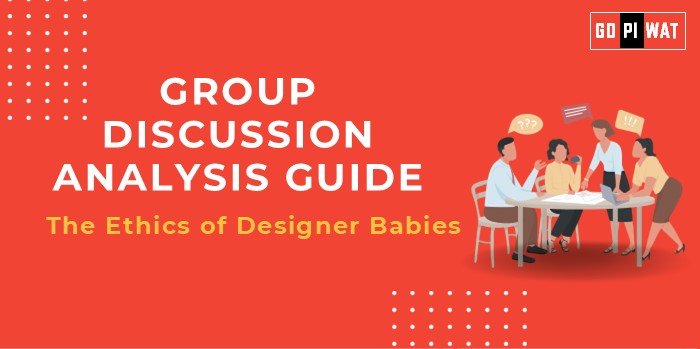📋 Group Discussion Analysis Guide: The Ethics of Designer Babies
🌐 Introduction to the Topic
Opening Context:
The advent of CRISPR and other gene-editing technologies has brought humanity to a critical juncture: we now possess the power to alter the genetic makeup of future generations. Designer babies, once a concept of science fiction, are becoming a plausible reality.
Topic Background:
Gene editing allows for the modification of DNA to enhance specific traits or eliminate genetic disorders. While promising for medical breakthroughs, it raises profound ethical, social, and philosophical concerns. The debate pivots on the balance between scientific advancement and ethical responsibility.
📊 Quick Facts and Key Statistics
- 🧬 CRISPR Discovery (2012): A game-changing gene-editing technology.
- 💵 Cost of Genetic Sequencing (2024): Less than $100, making accessibility feasible globally.
- 👶 First Gene-Edited Babies (2018): Twin girls in China altered to resist HIV infection, sparking global ethical debates.
- 🌍 Global Regulation Gaps: Only 29 countries have legislation addressing genetic editing for human embryos.
- 📈 Potential Market: Predicted $14 billion by 2030 for gene-editing tools in healthcare and enhancement sectors.
🧩 Stakeholders and Their Roles
- 🏛️ Governments: Regulators and policymakers shaping laws around gene editing.
- 🔬 Scientific Community: Innovators pushing the boundaries of what’s possible.
- ⚖️ Ethicists and Religious Groups: Advocates for moral considerations and societal values.
- 👨👩👧👦 Patients and Families: Direct beneficiaries or participants.
- 💼 Private Companies: Innovators and profit-driven players in the gene-editing market.
🏆 Achievements and Challenges
✨ Achievements:
- ✔️ Medical Breakthroughs: Gene editing has cured genetic conditions like sickle cell anemia and certain cancers.
- ✔️ Prevention of Inherited Diseases: Potential to eliminate diseases like Huntington’s or cystic fibrosis.
- ✔️ Advancements in Research: Gene editing accelerates drug discovery and biomedical research.
⚠️ Challenges:
- ❌ Ethical Dilemmas: Issues of consent, designer babies, and eugenics arise.
- ⚠️ Equity Concerns: Widening socioeconomic disparities if only the wealthy can afford such enhancements.
- ❓ Unknown Long-term Effects: Potential risks to the human genome and biodiversity.
🌎 Global Comparisons:
- 🇨🇳 China: Aggressively advancing gene editing, including controversial cases like Lulu and Nana in 2018.
- 🇬🇧 UK: Permits limited gene-editing research under strict regulation.
Case Study: He Jiankui Scandal (2018) highlighted the dangers of unregulated genetic experimentation.
💬 Structured Arguments for Discussion
- Supporting Stance: “Gene editing represents the pinnacle of scientific advancement, offering humanity a chance to eradicate genetic diseases and improve quality of life.”
- Opposing Stance: “Designer babies risk perpetuating inequality and unethical manipulation of human life.”
- Balanced Perspective: “While gene editing holds immense potential, robust ethical and regulatory frameworks are essential to prevent misuse.”
📚 Effective Discussion Approaches
Opening Approaches:
- 💭 Ethical Question: “Is humanity ready to play God by editing the fundamental building blocks of life?”
- 📊 Statistics Start: “With over 29 countries debating regulations, the world remains divided on gene editing’s future.”
- 📜 Historical Contrast: “From Mendel’s pea plants to CRISPR, genetic manipulation has always been a double-edged sword.”
Counter-Argument Handling:
- ✔️ Acknowledge emotional concerns while grounding responses in data and potential safeguards.
📈 Strategic Analysis of Strengths and Weaknesses
- ✔️ Strengths: Disease eradication, improved health, accelerated scientific innovation.
- ❌ Weaknesses: Ethical gray areas, accessibility inequities, unknown genetic implications.
- 💡 Opportunities: Collaboration on global regulation, equitable healthcare solutions.
- ⚠️ Threats: Misuse for eugenics, backlash from religious and cultural groups.
🏫 Connecting with B-School Applications
Real-World Applications:
- 🌟 Ethical leadership in biotech firms.
- 📚 Policy frameworks for emerging technologies.
Sample Interview Questions:
- ❓ “How would you regulate gene editing to balance innovation and ethics?”
- ❓ “What role can businesses play in ensuring equitable access to genetic therapies?”
Insights for B-School Students:
- 💼 Understanding ethical dilemmas prepares future leaders to handle disruptive innovations responsibly.


